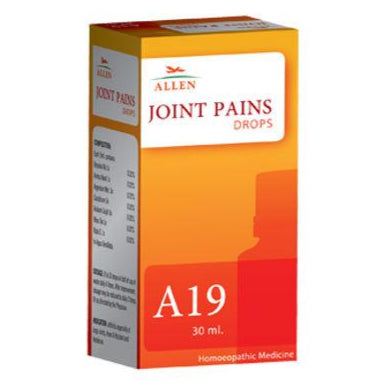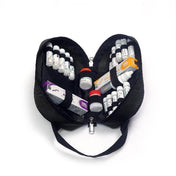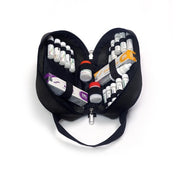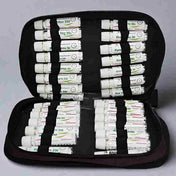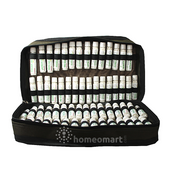Allen A19 Joint Pains Drops – Homeopathic Relief for Arthritis & Stiff Joints
Allen A19 Joint Pains Drops – Homeopathic Relief for Arthritis & Stiff Joints - 30ml Get 10% Off is backordered and will ship as soon as it is back in stock.
Couldn't load pickup availability
Description
Description
Say goodbye to joint pain and stiffness! Allen A19 Joint Pains Drops offer natural homeopathic relief for arthritis, improving mobility and flexibility—one drop at a time.
Effective Homeopathic Relief for Arthritis, Joint Stiffness & Mobility Support
Allen A19 Joint Pains Drops is a homeopathic formulation specifically designed to relieve arthritis-related discomfort, particularly in large joints such as the knees, hips, and vertebrae. It helps reduce stiffness, swelling, and pain associated with joint inflammation, improving mobility and overall joint health.
Mode of Action of Allen A19 Joint Pains Drops
The formulation works by reducing joint inflammation, stiffness, and pain while enhancing flexibility and muscle function:
- Bryonia Alba: Relieves joint inflammation with stitching and tearing pains, particularly aggravated by movement.
- Arnica Montana: Soothes bruised and sprained sensations, aiding recovery from physical exertion and injury.
- Argentum Metallicum: Improves cartilage and joint health, reducing tissue thickening and discomfort.
- Causticum: Addresses progressive loss of muscular strength and prevents tendon contractures.
- Acidum Sulphuricum: Provides relief from intense pain that builds gradually and stops suddenly.
- Rhus Toxicodendron: Effective for joint stiffness and numbness, especially worse after inactivity and cold exposure.
- Ruta Graveolens: Strengthens tendons, ligaments, and joints while alleviating inflammation and pain in periosteal tissues.
Composition of Allen A19 Joint Pains Drops
Each drop contains a synergistic blend of homeopathic ingredients known for their efficacy in joint and muscle pain relief:
- Bryonia Alba 1x – Alleviates joint pain with inflammation and exudation, characterized by stitching and tearing sensations.
- Arnica Montana 1x – Relieves soreness, bruised sensations, and dislocated-like pain, especially in the back and limbs.
- Argentum Metallicum 3x – Supports cartilage, bones, and joints by reducing thickening of tissues and improving flexibility.
- Causticum 3x – Addresses tearing, drawing, and burning pains in muscles and fibrous tissues, aiding in mobility and preventing contractures.
- Acidum Sulphuricum 3x – Reduces severe joint pain that gradually increases and then suddenly subsides, providing significant relief.
- Rhus Toxicodendron 1x – Ideal for stiffness, rigidity, and pain aggravated by damp, cold weather or movement after rest.
- Ruta Graveolens 1x – Targets fibrous tissues, tendons, joints, and periosteum, helping with node formation and improving joint flexibility.
All ingredients are suspended in Aqua Destillata (Distilled Water) for optimal absorption and effectiveness.
Dosage of Allen A19 Joint Pains Drops
- Take 10 to 15 drops in half a cup of water, four times a day.
- Once improvement is observed, reduce the dosage to twice daily or as prescribed by a physician.
Guidelines
- Homeopathic medicines should be used based on symptom similarity for best results.
- The effectiveness of the treatment may vary depending on individual health conditions.
- Consultation with a physician is recommended before use to ensure appropriate dosage and safety.
- Avoid self-medication and follow the prescribed regimen for optimal benefits.

